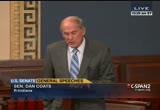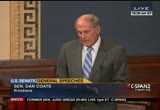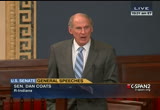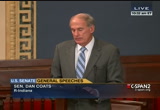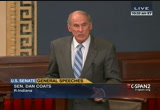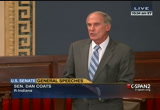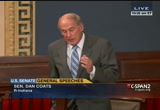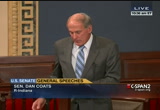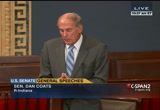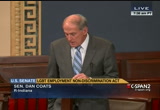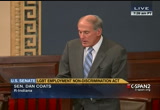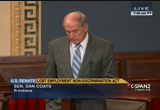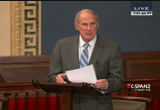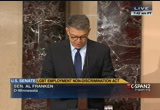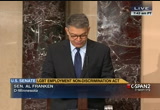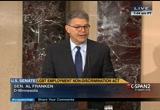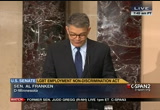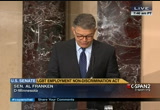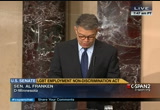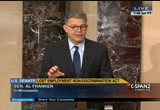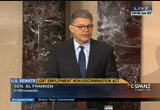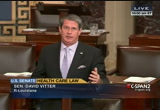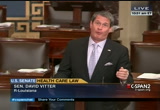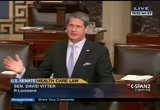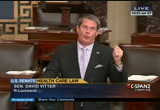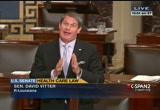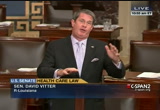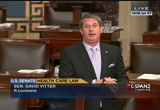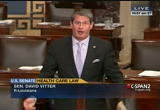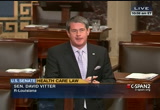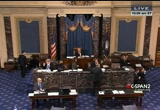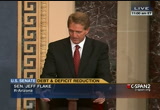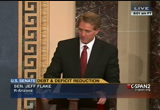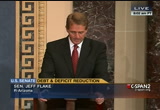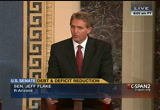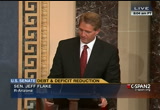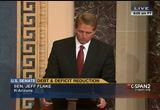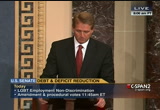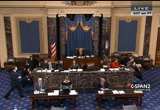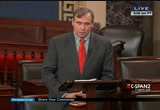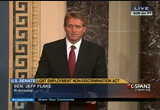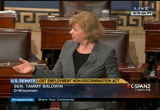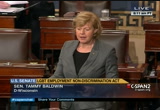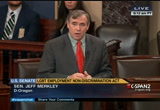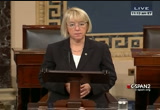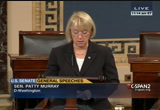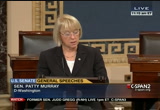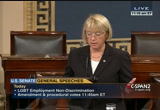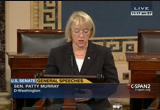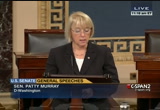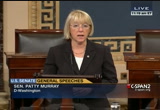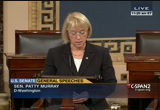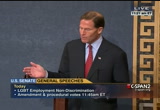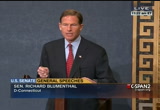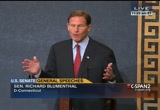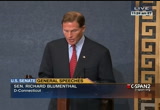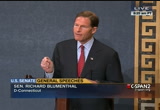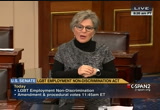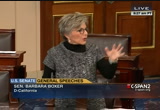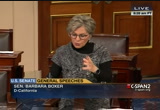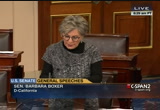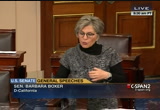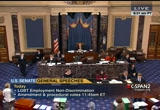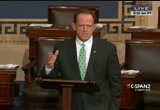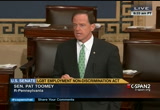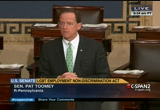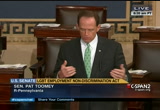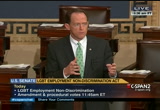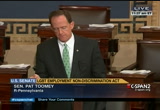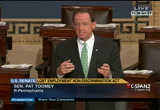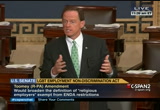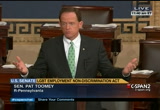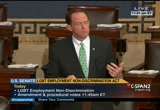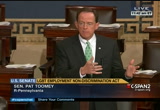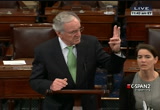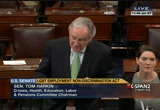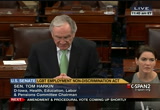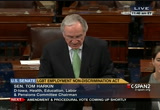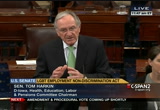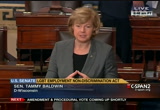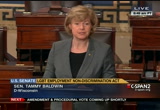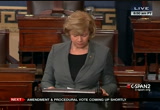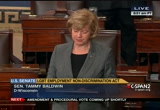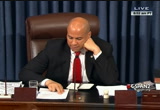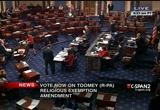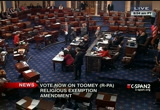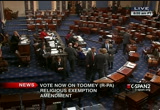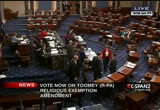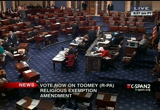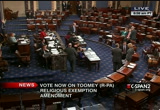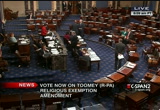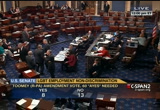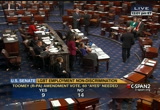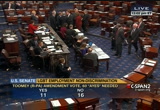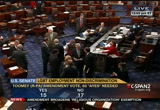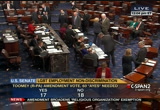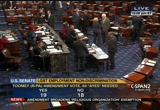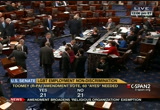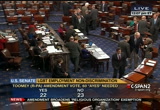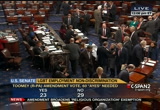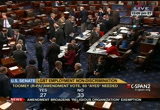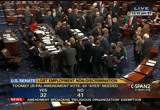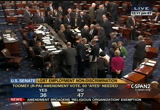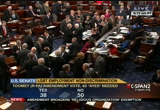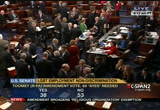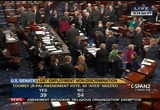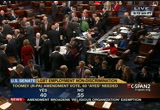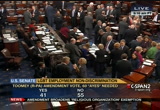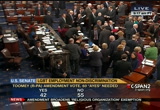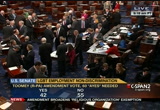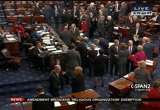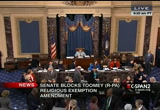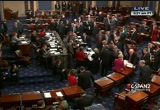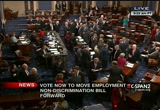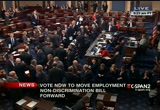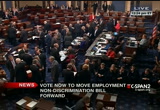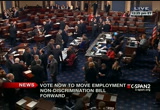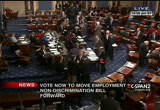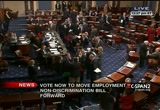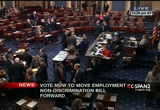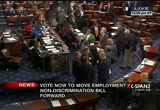tv Key Capitol Hill Hearings CSPAN November 7, 2013 10:30am-12:31pm EST
10:30 am
to paraphrase what thomas jefferson said in 1807, for americans, he said, among the most inestimable of our blessings is the blessing of liberty, to worship our creator in the way we think more agreeable to his will a liberty deemed in other countries incompatible with good government and yet proved by our experience in america to be its best support. from jefferson's time to today, freedom of religion has been a core american principle, a principle our founding fathers put their lives on the line for and a principle that generations of americans in uniform have defended so we can all enjoy this cherished freedom. unfortunately, this principle of religious freedom is under attack across our country today. though in many cases these
10:31 am
attacks may be subtle, make no mistake, we are seeing the free exercise of religion and freedom of speech constrained and restricted. we've seen it in the administration's rule regarding church-affiliated groups to facilitate insurance coverage that includes contraceptives and abortion-inducing drugs despite their deeply held religious beliefs. i think about my alma mater, wheaton college he in illinois, illinois, -- wheaton college in illinois, which is the school from which billy graham graduated years ago. i appreciate the majority leader and minority leader's reference to his life as he celebrates his 95th birthday. billy graham had an important impact on my life and millions not just of americans, but people around the world. i appreciate that recognition that has been given here by our
10:32 am
leaders. but i also think about our indiana-based university, notre dame. despite conscious objections and the clearly outlined standards of the colleges and universities -- colleges community covenant at wheaton and the values of the university of notre dame, they have been told by the government that they are not considered religious institutions and must comply with the health and human services mandate. let me describe a little bit the threat of faith that runs through every aspect of a school like wheaton college and the values of faith expressed frequently in a number of ways by the university of notre dame. if you tune in to the notre dame football programs on saturday
10:33 am
afternoons, as i do every week, or attend, you will see an ad by father jenkins, president of notre dame, that talks about the component and the element of faith that is essential to the beliefs of what the university of notre dame is trying to address through its education process, through its socialization process, through all, whether it's professors or students, administrators, ground keepers or others, that threat of faith that runs through the values of that university and through my alma mater. there's such a thing as, it's been described by former president wheaton, as umbrella universities, those that have a faith component perhaps in a theological school or religious program, and the thought is well, certainly, they can exercise their constitutional
10:34 am
rights guaranteed by the first amendment. but what about the doorkeeper or what about the receptionist at the administration building or the coaches of the teams or the professors? sure the professor of theology, professor of religion. but professor of science, professor of economic, professor of business, how does that apply? or what about the grounds keepers or those that serve the meals in the cafeterias to the students? well, there are those types of institutions, and there is an argument that is not systemic, it is not the thread that runs through every aspect of the program. and this applies to homeless shelters, faith-based institutions all across america. some are secular related. some are a mix of secular-religious. and some are systemically faith
10:35 am
based. a thread of faith runs through every aspect of their program or this institution. so what we're talking about here is a situation where institutions of education, like wheaton college and the university of notre dame, or faith-based institutions reaching out through homeless shelters, food kitchens, any number of programs provided by faith-based institutions or individuals engaged in this that believe that the thread of faith is important to their success and that's why they're there, those have been told by the government that they're not considered religious institutions and must comply with the health and human services mandate. last year administration officials said they worked out a compromise on this rule, but the fact is that the mandate still exists. these institutions should not have to facilitate insurance
10:36 am
coverage for products that are counter to their moral beliefs, in my opinion, to require faith-based institutions to betray the fundamental tenets of their beliefs and accept this violation of their first amendment rights guaranteed by the constitution is simply wrong. i think about the health care professionals who have been required to participate -- required by the government to participate in medical procedures that violate their rights of conscience and their deeply held religious beliefs about the meaning of life and when life begins. i think about the recent efforts in many states to force churches and religious professionals into performing rituals or ceremonies that run counter to their faith. so what is at stake here is of extreme significance. established in our nation's founding days and sustained for over 200 years, this principle
10:37 am
is at the very core of our system of government, as jefferson was trying to say. we can't pick and choose when to adhere to the constitution and when to cast it aside for cheap political prog 0 alternatives. we must -- prerogatives. we must consistently stand for these timeless constitutional granted privileges and rights. the legislation before us raises very serious concerns regarding religious freedom. the so-called protections from religious liberty in this bill are vaguely defined and do not extend to all organizations that wish to adhere to their moral or religious beliefs in their hiring practices. for example, the religious beliefs of faith-based child-care providers and small business owners would be disregarded under this legislation. faith-based day-care providers could be forced to hire individuals with views kraeur t-
10:38 am
contrary to the faith incorporated values of these day-care providers. do we want to support policies that discriminate against an employer's religious beliefs and require employers to hire individuals who contradict their very most deeply held religious beliefs? this bill will also, would allow employers to be held liable to a work place environment complaints opening the door to the silence of employees to express their deeply held beliefs. this possibility runs counter to everything america stands for in the realm of free speech. now i know there have been some efforts, including amendments offered by my colleagues, senator toomey from pennsylvania and senator portman from ohio, to clarify the existing religious protections in this bill. some members believe that these amendments go too far.
10:39 am
i frankly believe they don't go far enough. however, they are at least a first step, and i will support these two measures not to make a bad bill better but to highlight the importance of the freedom of the religious principle involved in this legislation. let me quote from jay sekolow, chief counsel of the american center for law and justice. he wrote this. steadfast commitment to one's scruples was once lauded as a virtue. but in the current public discourse, religious objectors are often chastised as seeking special treatment that would impose their values on others. the apparent unpopularity of the expression of religious values through actions or words brings to mind justice oliver wendell holmes' observation -- and i quote -- "we should be eternally
10:40 am
vigilant against attempts to check the expression of opinions that we loathe and believe to be fraught with death. and the supreme court's" -- let me repeat that. justice holmes said waoerbld -- we should be vigilant against tempts to suppress opinions of religion. the supreme court's most recent reminder, and i quote again, "the first amendment attempts expression, be it of the popular sraoeurt or -- popular variety or not holmes said. it is an important thing for us to remember from a very respected supreme court judge. i oppose discrimination of any kind, and that includes discrimination, however, also of individuals or institutions for their faith and values which
10:41 am
often gets lost and has been lost in this discussion. so there's two types of skrugs here -- two types of discrimination here we're dealing with and one of those goes to the very fundamental right granted to every american through our constitution, a cherished value of freedom of expression and religion. and i believe this bill violates that freedom and diminishes it. so i feel it's vital for this body to stand up for our country's long-standing right to the freedom of religion and speech. for these reasons, i am not able to support this current legislation, and i hope my colleagues would stand with me in protecting this religious freedom and oppose this legislation. mr. president, with that, i yield the floor and i note the absence of a quorum. mr. franken: mr. president? the presiding officer: will the senator withhold his suggestion for the absence of a
10:42 am
quorum? mr. coats: i will. i apologize for not recognizing my colleague from minnesota. standing in the back row and my eyesight is not as good as it used to be. mr. franken: i can see you. mr. president? the presiding officer: the senator from minnesota. mr. franken: i rise today in strong support of the employment nondiscrimination act. in many towns and cities and states across our country it is perfectly legal to fire someone simply because they are gay. you can be a hard worker, you can show up on time and get exemplary performance reviews, but if your boss discovers that you're gay or transgender, or suspects it, he can fire you just for being who you are or for whom you love, and there is nothing that you can do about it. that is a terrible injustice for americans who happen to be lgbt.
10:43 am
it violates the principle that we are all equal under the law. we all deserve the chance to work hard and to prove ourselves, regardless of our race, color, religion, sex, national origin, disability, age or sexual orientation or gender identity. many americans don't even realize that it remains illegal to discriminate against lgbt americans in the workplace. in one recent poll, eight in ten americans believe that it is already illegal under federal law to fire or refuse to hire someone because of their sexual orientation or gender identity. doesn't that tell you something about how obviously right enda is? the debate that we are having in
10:44 am
the senate today is about whether we should ensure that lgbt americans don't suffer discrimination in the workplace. i have long been a supporter of enda, and enacting it into law is something that we should have done a long time ago. in fact, 17 years ago it came within one vote of passing in the senate. making enda law will be the next significant step in the fight for equality for lgbt americans. after decades of struggle, we have achieved a number of huge victories in rapid succession. ending don't ask, don't tell. overturning the federal ban on same-sex marriage recognition. the achievement of marriage equality in more and more of our states, including my home state of minnesota. while we are debating enda in the senate today, equality in
10:45 am
the workplace is in fact something we achieved in minnesota over two decades ago. in 19193, the minnesota state legislature amended our state's museum rights act to protect minnesota's workers from discrimination based on their sexual orientation or gender identity. at the time, only a few states prohibited discrimination based on sexual orientation and minnesota was the first state to include protection for transgender workers. we have had this law in effect now for over 20 years in minnesota and what has been the effect? well, for lgbt minnesotans, it has meant that they don't have to live in fear of being fired or discriminated against in hiring just because of who they are or because of whom they
10:46 am
love. that is -- that is a big deal. but if you're not an lgbt minnesotan, very little has changed. some people, including house speaker boehner, are opposing enda because they claim it will cause frivolous lawsuits and be bad for business. the minnesota experience shows that these fears are unfounded. there has not been a flood of lawsuits because the rights of lgbt minnesotans are widely respected. and with 19 fortune 500 companies, minnesota has become an ever-better place to work and do business. minnesota is basically the same ias it was before this law was passed except that it is better. because lgbt minnesotans are free from discrimination at work. let me give you one example.
10:47 am
last year a vice president from general mills, the minnesota-based company that is one of the world's largest food companies and which currently employs 35,000 people and makes cheerios, spoke at a senate health education, labor, and pension committee for making sure that the same legal protections people have in minnesota are extended to workers all across the united states. the general mills vice president spoke about how the company's policies -- policy of inclusion has contributed to its innovation and growth. he said, and i quote, "employees who are members of the glbt community are incredible contributors to our enterprise. absent their unique
10:48 am
perspectives, talents, and gifts, we would be less competitive and successful. simply said, talent matters. now more than ever, american business needs to lefnlg the ingenuity of all sectors for our nation. discriminatory barriers to top talent just don't make business sense." unquote. and there are many other large employers headquartered in minnesota -- target, supervalu, u.s. bank court, exxon energy, 3m, cargill, best buy, and many, many others who have put in place qup-wid company-wide polis against discrimination based on
10:49 am
sexual orientation or gender identity. minnesota's small businesses have also reported on the positive effects of minnesota's human rights law. for instance, nancy lyons is the owners of a small 70-person minneapolis business that develops soft weamplet the protections and peace of mind that her employees get from not living in fear positively impacts every aspect of their lives, from their productivity at work to their family lives. it is long past time that lgbt employees around the country be guaranteed the same rights that they have had in minnesota for 20 years. in minnesota our law has given lgbt minnesotans peace of mind and freedom from discrimination at work and improved the overall climate in our state for those individuals, for families, and for businesses.
10:50 am
i look forward to the senate passing this bill, and hope that the house will take it up and pass it as well. thank you, mr. president. i yield the floor. mr. vitter: mr. president? the presiding officer: the senator from louisiana. mr. vitter: thank you, mr. president. i come to the senate floor today, mr. president, to urge my colleagues again to focus on an important issue in the overall obamacare debate, and that is how washington fares under obamacare and does washington live by the same rules, the same laws it passes on the rest of america. now, mr. president, all across the country, as we see daily in news reports, americans are struggling with real issues and real challenges created by obamacare. and we need to fix those issues and those challenges. we need to get it right.
10:51 am
but at the same time as that's going on in the real world, washington -- leaders here basically get an exemption, a carve-out, special treatment, a subsidy. and that is particularly egregious and particularly unfair, when ordinary americans suffer under these very real challenges. that's why i've introduced my "no washington exemption from obamacare" bill. that's why i continue to work hard with my cosponsors to get that passed. now, mr. president, with regard to congress, the obamacare statute actually got it right. and with regard to congress, all we're asking for is that we live by the sai statute and live by e law. that statutory language says clearly that every member of congress and all of our congressional official staff go
10:52 am
to the exchanges for our health care and be treated just like other americans going to the exchanges, many of them being forced off plans, employer plans, they liked and having to go to the exchanges. no special treatment, no special exemption or carve-out or subsidy. the problem is that, after the law passed, i guess it was a classic case of what nancy pelosi said. we have to pass the law in order to figure out what's in t because after obamacare passed with that specific statutory language, a the love folks on capitol hill read it, figured out what was in it and said, oh ... you know what ... we can't live with this and then they started lobbying for way around it. and ghoat it. the obamacar obama administratid
10:53 am
a special rule for congress to take all of the financial sting out of the provision. the rule basically said two things, both of which i this are outrageous and contrary to the statute itself. first of all, it said, you know, i know the law says all official staff go to the exchanges, but we don't know who there is a. we don't know who official thas staff are so we're going to leave it up to each individual member of congress to designate who is official staff, who must go to the exchanges for their health care. well, mr. president, i just think that is flat-out ridiculous. the law, the statute clearly says, all official congressional staff a, and to create this opportunity for exemption where each individual member designates staff as official or not is silly. that designation, by the way, happened last week and some members have actually said, none of my staff is official.
10:54 am
i have no official staff for purposes of this section, so none of my staff go to the exchanges. that's outrageous. other members said, well, my personal office straff is official, leadership staff, no. that's outrage arks too. the second thing this illegal rule did to get around the impact of this provision of obamacare is to say, well, for members and staff who do go to the exchanges, they get to take with them a huge taxpayer-funded subsidy. a big subsidy that no other american at that income level gets. and that's not in the obamacare statute either and that's contrary to the obamacare statute. in fact, that specific language was considered for inclusion and was not put in, proof that that was not the intent of that
10:55 am
section of obamacare. i believe that's outrageous as well, mr. president, and defeats the whole purpose of the section, which is to make sure members of congress and our staff walk in the same shoes as other americans, 8-plus million of whom are being forced off coverage they like and being forced onto the obamacare exchanges. that's why i have joined withers to push this "no washington exemption" from obamacare language. as i mentioned, one key element of this is this election that this illegal rule creates, wherever individual member of congress determines who on their staff goes to the exchange or doesn't. and as i said, in some cases, members say, i have no official staff, nobody has to live by the law, nobody has to live by this
10:56 am
mandate, which is particularly outrageous. now, to add insult to injury, these individual decisions by every member of congress are not public. this is all secretive. this is hidden from the public. some members have said what they're doing, through the press. but the full information, each individual member's election with regard to this is not public. and so as soon as that loophole was created, i field another bill, another piece of legislation, and that simply says we're going to make all of these decisions public. everybody has a right to know how each member of the senate, how each member of the house is handing the situation. and that's my "show your exemptions" bill, which i filed about ten days ago. i think it should be a no-brainer. i think it should be beyond debate. whatever you think about the
10:57 am
underlying issue, whatever you think about obamacare, shouldn't this decision of each individual member be made public? shouldn't the public have a right to know? and so that's why i filed this bill. that's why i'm pushing for a vote on this bill. and getting a vote on that proposal will be a key priority of mine, particularly when we consider the drug compounding bill in the near future and when we consider the department of defense authorization bill. it's going to be my key priority to get a simple vote on that simple proposal. again, i believe that should be a no-brainer that this information, which does involve how taxpayer dhars are being created, which does involve how congressional offices are handing the information, that information one way or the other be made public.
10:58 am
don't need to editorialize about it. everybody can make up their own mind about what they think about the underlying issue, about what they think about obamacare, but shouldn't that information be made public? we need to vote on that proposal, and i urge us to move and agree quickly to a vote, either in the context of the drug compounding bill or the defense authorization bill over the next few weeks. those are probably going to be the only opportunities for a vote this calendar year, and i think it's certainly fair and reasonable to get that vote, have the american people be able to see that information, and really that's the only opportunity i'm likely to have in the senate this calendar year. again, whatever my colleagues think about the underlying issue, certainly whatever we all think about obamacare, i would hope we can all agree on this. that election, that information,
10:59 am
how each individual member of the senate, each individual member of the house handles the situation should be made public. it certainly involves public policy and taxpayer dollars and how we run congress. it should be made public. and i urge my colleagues, republicans and democrats, to unite around that reasonable commonsense proposal and get that information out to the public, as it should. thank you, mr. president. with that, i yield the floor and suggest the absence of a quorum. excuse me, mr. president, i would withhold my suggestion of the absence of a quorum. but i do yield the floor. the presiding officer: thank you. senator flake from arizona. mr. flake: mr. president, after weeks of budget wrangling and government shutdown that has the country on edge, last week marked the beginning of the
11:00 am
bicameral budget conference. i want to commend my colleagues that are meeting on the issue and trying to reconcile the goals of wildly different budget outlines that. is no easy task. i think we all know that. however, we all know that shoveling more i.o.u.'s into our $17 trillion debt is simply unsustainable. no matter which side of the aisle we sit on, i hope we can all agree that america's present fiscal trajectory is untenable and that our nation's future depends on turning these economic issues around. there's no secret formula here. at a minimum, congress should abide by the budget control framework which has produced some of the most meaningful discretionary spending reductions in decades. beyond that, we have to slow rising costs of entitlement programs in order to achieve significant long-term deficit reduction. sadly, some seem fixated on spending beyond the b.c.a.'s cap
11:01 am
for next year. some of our colleagues have suggested that the spending discipline that we achieved with the sequester should be replaced with revenue increases. now, we all know that sequestration is a blunt instrument for reducing spending, but this desire to replace it by driving up taxes is based on an incorrect assessment. washington has a spending problem, not a revenue problem. in 2013, government spent some $3.5 trillion. we're track to spend another $3.7 trillion in 2014. before anyone starts to look at tax hikes, we should realize that we are nowhere near cutting our budget to the bone. in fact, there are a lot of -- there's a lot of fat left in a lot of agencies. these budgets deserve to get the knife. but don't just take my word for it. the administration, our colleagues, the congressional budget office, the government accountability office, and numerous concerned taxpayer organizations have all proposed examples of wasteful spending
11:02 am
that should be eliminated. at the sequester's -- or if the sequester's bluntness has taught us anything, it's that congress ought to jump at the chance to make smart, surgical spending cuts. to that end, i intend to take five minutes each week for the coming weeks to highlight some of the wasteful spending programs that still, even in times of economic belt tightening, lurk in our federal budget. today i'd like to highlight some of the programs in the u.s. department of agriculture. with a budget request of $146 billion in 2014, the usda rounds out the top five most expensive federal agencies. many programs within the usda provide valuable services, including meat inspection, crop data collection, and managing the agricultural safety net. but the usda also has its own agency-level homeland security department, pays for sunkist to advertise overseas, and underwrites an astonishing number of zero down payment
11:03 am
suburban home mortgages. that's the usda. the most obvious place to realize significant savings in the usda is with the federal crop insurance program. here's a program in which the taxpayers cover the majority of risk that pays private insurance agents commissions to sell administration -- to sell and administer individual policies, it funds the oversight of the program, and on top of all that, subsidizes policyholders' premiums. that's a pretty good deal if you can get it. in 2012, taxpayers spent more than $ billion -- more than $7 billion to subsidize this program. and in 2010, one of the better recent crop years, when the usda took in a record $2.5 billion more than it paid in claims, the federal crop insurance program still cost taxpayers $3.7 billion. that's because taxpayers foot the bill for roughly two-thirds of each premium, leaving the policyholder to cover only the
11:04 am
remaining third. congress could reap significant savings just by reducing the percentage that taxpayers have to spend to subsidize these premiums. in fact, according to c.b.o., simply rolling back the percentage of taxpayer subsidies in the program to pre-2000 levels would shave more than $40 billion in spending from pre-2013 -- the farm bill baseline in 2013. to that end, i've introduced the crop insurance subsidy reduction act, which would do just that. there are a number of other places at usda where congress can find savings. one of those surely is usda's own office of homeland security, created in the post-9/11 security glut. this department is supposedly responsible for providing oversight and coordination for usda's preparation and response to matters of homeland security importance. mr. president, a $1 million program like this may be easily lost in the president's $4 trillion budget, but this is
11:05 am
an entire agency of the federal government tasked with the same objective and funded with the same tens of billions of taxpayer dollars. another place to find savings at usda is in the market access program, which has spent $1.4 billion since 2006 and looks to collect another $200 million in taxpayer funds in 2014. this program has spent billions of tax dollars subsidizing overseas advertising campaigns that benefit some of the most deep-pocketed corporations around, including mcdonald's, nabisco, welch foods and sunkist. when it comes to questionable budgetary items at usda, the single-family housing district and guaranteed loan program takes the cake. this obscure but growing home loan program writes and guarantees mortgages for low- and moderate-income families in rural and suburban areas. these loans are 100% financed and require no down payment. while home buyers in big cities aren't eligible for these loans,
11:06 am
residents of many fast-growing towns and suburbs, some within 30 miles of this very building, are receiving those kind of subsidies. don't be fooled again in to thaig these loans are for -- thinking that these loans are for rust i can farmhouses either. they are designed to finance your home. and inexplicably, the usda discourages buyers from using them to purchase farms or ranches. this is a usda discouraging using these subsidies to purchase farms and ranches, but, rather, regular homes. since 2006, the usda -- remember, that's the department of agriculture -- has spent nearly $10 billion on single-family housing direct loans. and while it didn't show up in the budget, home loan guarantees by the usda have also put taxpayers on the hook for another $118 billion. the agency has requested another $320 million to fund single-family home -- housing direct loans in 2014 and plans
11:07 am
to issue another $24 billion in guarantees. to put these figures in perspective, the entire department of housing and urban development submitted a budget request of $47 billion. when we have such egregious examples of waste as these, why, mr. president, should we demand more of the taxpayers' money? in the come weeks, i hope my -- coming weeks, i hope my colleagues on the budget committee, along with members of congress along with various fiscal organizations, will consider some of the proposals i'm offering to eliminate this wasteful spending, a good start would be sewing the seeds of fiscal restraint at the department of agriculture. and, mr. president, i yield the floor. a senator: mr. president? the presiding officer: the senator from oregon. mr. merkley: thank you. i ask unanimous consent to have a short colloquy with the junior senator from arizona and the senator from wisconsin. the presiding officer: without objection. mr. merkley: thank you very much. i appreciate so much the
11:08 am
comments of my colleague from arizona on the challenges inherent in getting our budget under control, and i particularly appreciated over the last few days the conversation we've had about the employment nondiscrimination act. and i would like to say that you have -- the senator from arizona has brought particular value in expressing concerns about how we make sure businesses have the guidance that they will need to implement this act effectively and that particularly, as this act embraces an area and that is transgender discrimination, that was not a part of the act that was considered in the house of representatives. mr. flake: i thank the gentleman from oregon. i appreciate the work that -- that his office did with my office this week to try to arrive at language that we could put into an amendment. we weren't able to -- to get that amendment but when i voted
11:09 am
for enda in the house in 2007, as the gentleman mentioned, it did not contain the provisions with regard to gender identity. those added provisions have concerned me in terms of potential costs of litigation or compliance. i -- i still have those concerns and i hope that as we work through the process, as this bill moves on to the house, that we can find ways to -- to make sure that employers can implement these provisions in a way that -- that is reasonable and proper. and i -- i also want to thank the gentlelady from wisconsin for working with my office on these issues as well. i -- i have a better appreciation for what -- what needs to be done and what -- what we can do with this legislation as it moves through the process. i yield to the gentlelady from wisconsin. mr. baldwin: thank you, mr. president.
11:10 am
i want to just express my appreciation and gratitude to the senator from arizona for his very thoughtful and careful approach to considering this legislation. i enjoyed working with the senator during our days in the house of representatives and remember well the vote that the senator cast back in 2007 after great study and reflection. and i also want to say that i i think we find ourselves at the position we're at right now, with an expanded bill that has protections for both sexual orientation and gender identity because of the leadership of the senator from oregon. and to the point of the concerns that have been raised in this colloquy, there's been a really exhaustive amount of research done on those states that have
11:11 am
passed similar pieces of legislation at the state level and how they chose to move forward on employment protections on the basis of sexual orientation and gender identity. and i've discussed with the senator from oregon on numerous occasions the -- the approach that most states have taken and the success that those bills have had in helping to keep all of our employment decisions based on work ethic and character and loyalty and -- and the things they should be focused on. and so i look forward in the future to working on -- on this measure and just want to thank both the senators from arizona and the senators from oregon for their focus on enda.
11:12 am
mr. merkley: mr. president, i look forward to that conversation as well. i know the state of wisconsin was one of the first or maybe "the" first in the nation to bring an end to workplace discrimination. oregon has a fully inclusive bill which has worked very well, we worked out a great partnership with the businesses of oregon in making sure that the satisfactory guidance for them. and i look forward to bringing that experience into this conversation to the concerns of the senator from arizona. and i echo the appreciation for the thoughtful dialogue that we've had over the past few days and look forward to future dialogue as we continue to try to -- to make this bill, ending discrimination in the workplace, work well for businesses across the nation and certainly for the millions of lgbt americans who will have the opportunity to -- to break these chains of discrimination and more fully participate in our national
11:13 am
economic life. mr. flake: i thank both the senator from oregon again and the senator from wisconsin for working with us and look forwa forward, as this process goes on, to make sure that -- that the provisions in the legislation work for employers as well as employees. and i -- i really appreciate the work on this and the -- the assistance you've given our office on this. thank you so much. mr. merkley: thank you, mr. president. i yield the floor. mrs. murray: mr. president? the presiding officer: senator murray. mrs. murray: mr. president, i ask unanimous consent to speak as if in morning business. the presiding officer: without objection. mrs. murray: thank you, mr. president. and i want to thank senator blumenthal and senator boxer, who will be joining me in this conversation in just a few minutes. mr. president, i think now more than ever, after we have emerged
11:14 am
from this very damaging and completely unnecessary government shutdown, the american people want us to focus on jobs and the economy. it is what every poll says. it's what every one of our constituents say. and it's absolutely what is needed at a time when families continue to struggle to make ends meet. but instead of work with us across the aisle -- but instead of working with us across the aisle on jobs and economic growth, it seems like some republicans are now focused on something else entirely -- politics. in fact, mr. president, in just a short while, the senior senator from south carolina is going to be introducing a bill here that is blatantly political. a bill that not only undermines a woman's access to her doctor but also restricts an array of reproductive health services. so we are here today to make one thing abundantly clear and that
11:15 am
is that this extreme, unconstitutional abortion ban is an absolute non-starter. it is going nowhere in the senate and those republicans know it. mr. president, i'd like to think that over the last 40 years, since the historic decisions on roe v. wade, we have moved on from debating this issue. i'd like to think that after four decades, many of those who want to make women's health care decisions for them have come to grips with the fact that roe v. wade is settled law. after all the many signs of progress are all around us. this year a record 20 women are serving here in this body. one year ago yesterday, women's power and voice at the ballot box was heard loud and clear. in effect, last year when a republican candidate for office thought that rape was a political talking point, that idea and their candidacies were swiftly rejected thanks in large
11:16 am
part to the voices of women. and just this week we saw women in virginia resoundingly reject the republican candidate for goafn and his misguided and outdated agenda for women's health. so sometimes it's tempting here to think that times have indeed changed, that maybe, just maybe, politicians have realized that et going between -- that getting between a woman and her doctor is not their job, that it's possible that right-wing legislators have a newfound respect for women's health care. but, mr. president, the truth is that the drumbeat of politically driven, extremist and unconstitutional laws continues to get louder, and apparently some of our colleagues on the other side of this aisle want to make some noise about this so that their adoring audience of right-wing radio hosts and columnists and being activistse satisfied. an example of how bla blatant ts
11:17 am
restrictive ban is, one of their participants in the press conference to introduce their bill today had this to say to "politico" about the strategy behind doing it. she said, and i quote, "it's a much better thing to be campaigning on than rape and incest these days." mr. president, that is an insult to women everywhere. and it is most certainly not what the senator from south carolina has called -- quote -- "a debate worthy of a great democracy." this is a debate we've had. a woman's access to her own doctor is settled law, and we are not going to let attacks on roe v. wade, like this one, change that. and, mr. president, i'd like to remind all those even considering supporting this bill that real women's lives and the most difficult health care decisions they can ever possibly
11:18 am
make are at stake. i want us to consider the story that judy nicastro from my home state shared with "the new york times" last summer. in an op-ed she wrote, just days after the house passed a bill that was virtually identical to the one that is being introduced today, judy talked about being faced with what ever pregnant woman's worst nightmare is. in describing the news that one of the twins that she was carrying was facing a condition where only one lung chamber had formed and that it was only 20% complete, judy captured the anguish that countless women in similar positions have faced. "my world stopped," she wrote. "i loved being pregnant with twins and trying to figure out which one was where in my uterus. the thought of losing one child was unbearable."
11:19 am
she went on to say, "the m.r.i. at seattle children's hospital confirmed our fears: the organs were yo pushed up into our boy's chest and not developing prorld and we were in the 22 $-- and not developing properly, and we were in the 22nd week." the decision that judy ultimately had to make through a very painful time and conversations with her family and consultation with her doctors would be illegal. the decision to make sure, as she put it, "our son was not born only to suffer" would be taken from her and given to politicians. mr. president, i'm here today to provide a simple reality check. we are not going back. we are not going back on settled law. we're not going to take a woman's -- take away a woman's ability to make her own
11:20 am
decisions about her own health care and he had own body. women are not going to go back to a time when laws forced them into back alleys and made them subject to primitive and u unsanitary care. and senators like me and senators boxer and senator blumenthal and others who join me in opposing this effort are not going to go anywhere. advocates and doctors who treat women every day and know that their health care must be protected are not going to go anywhere. women who continue to believe that their health care decisions are theirs alone are not going anywhere. arntiondz by thand, by the way,e constitution is not going anywhere. the and, therefore, this bill is not going anywhere. this bill, like a tax on roe v. wade before it, will eventually be lost to history, but i will tell you, millions of american women will not forget. thank you, mr. president. i yield the floor, and i welcome
11:21 am
our colleagues here to this debate. mr. blumenthal: mr. president? the presiding officer: the senator from connecticut. mr. blumenthal: thank you, mr. president. i want to thank my colleague from the state of washington for her eloquence and her leadership on this issue, as i do my colleague from california. she has been steadfast and strong in support of a woman's right to make choices about reproductive rights. and she's absolutely right. we're not going away. this bill that will be introduced later today by our colleague from south carolina, as much as we may respect him, is a nonstarter because it is nonsensical and unconstitutional. this bill boose was passed by te house of representatives earlier this year, and we could not have clearer then, and we should be very clear now that it is inappropriate, unwise, unfair, and it remains so today and will
11:22 am
be so for as long as we are he here. this bill essentially leaves any woman who needs an abortion for health reasons -- and i stress "for health reasons" after 20 weeks of a pregnancy with no options, none. and it punishes doctors with up to five years in prison for providing a service that the doctor believes in his or her professional judgment, in his or her medical opinion is best for her and her family. those decisions are what the constitution protects, what roe v. wade guarantees, what the right of privacy preserves in the right to be left alone. quite simply, this bill is bad for women, and it criminalizes
11:23 am
medical professionals who would try to do what is right. i have a long history in law enforcement, and this sort of ban, which would leave women in completely desperate circumstances with no options, is shortsighted, misguided, and illegal. and we should be here not talking about proposals that would degrade and disgrace the constitution but about job measures and economic growth bills and measures to solve the immense challenges that confront us in dealing with budget issues. and i thank the senator from washington state for the great work that she is doing on those issues. but we should be here debating the issues that really concern and confront the american people at this historic, challenging time, not a measure that will be
11:24 am
struck down by the courts because it is so plainly unconstitutional and so clearly bad policy, not just for women but for men and families and for all of us. we've seen bill after bill in recent times stalled by disagreements over health care. we've seen the federal government shut down over health care, and now we see another legislative attempt to win essentially political points at the expense of of risking the health and welfare of women in this country. the attack on women's health care must stop. so, mr. president, we're here today in the midst of a busy legislative session to restate the fact that this bill is going nowhere. my colleagues and i will not allow this bill to put women's lives at risk, to put their
11:25 am
health care in jeopardy with politically motivated attempts at destroying constitutionally protected rights. that is why we're elected in this body, to take stands and speak out, to protect the people who are most vulnerable and to make sure that women who are at risk can be allowed to make personal, private decisions about their health and their bodies without obtrusive interference from the government. these decisions should be made by women and their families and medical professionals and whom ever else they wish to consult, not by politicians. thank you, mr. president. i yield the floor to my colleague from california. mrs. boxer: mr. president? the presiding officer: the senator from california. mrs. boxer: mr. president, it's very good to see you
11:26 am
sitting in that chair, and since you've come, we've cast some landmark laws -- votes here for laws that are so i didn't thinko critical and candidate that are so critical. we're about to have a moment in history here where we're going to expand protections to the lgbt community, expand protections for them, so no longer will they fair face fear in the work -- so no longer will they face fear in the workplace. if we have an overwhelming vote, i think it will send a message to speaker boehner that he should join with us. after all, what is the purpose that we should serve here? it is really making life better for people. and it certainly is protecting our people. and that leads me to the reason i'm here. at the request of senator murr murray, we need to speak out against the bill that will shortly be introduced. and it is ironic, because just
11:27 am
as we're about to end discrimination on a whole group of worthy people, this bill attacks another group of people, the majority of this country: women. and we're here to say that the extreme and dangerous 20-week abortion ban is not going anywhere in the senate, not on our watch. and anyone who knows us, knows we mean what we say and we say what we mean. the american people continue in election after election to reject the war on women. they did it in race after race in the 2012 cycle, and they did it in these local races -- statewide races just a couple of days ago. the american people want us, regardless of party, to focus on issues that really make a difference in their lives, like creating jobs, reforming our immigration system, keeping college affordable for students, and i think rebuilding an
11:28 am
infrastructure that is failing us. they don't want to take us back to the last century and open up battles that have long ago been fought. 1973 -- i see my friend from iowa here, a real chaf championf roe v. wade, a decision that was made by the court that was a really tough decision, and they really did takers i think, a mod -- did take, i think a moderate view of balancing all the interests. and here we have yo a bill being introduced today that has been shopped around by the most extreme elements in our country that would essentially say roe v. wade doesn't make any difference and it opens up a direct assault on women's health, a direct assault on roe v. wade, a direct assault on doctors. it is a radical bill. it is an abortion ban. it offers no health exception, no health for women facing
11:29 am
cancer, facing kidney failure, facing blood clots or other tragic compl complications duria pregnancy. no exception for women who are a vick of rape or incest. it throws trusted doctors into jail for five years simply for providing needed knock their patients. i want to tell who opposes this. the american congress of obstetricians and gynecologists. he they said that these restrictions are dangerous to patient safety and health. i want to talk to you about judy shackleford. four months into her pregnancy she developed a pregnancy-induced blood clot in her affir arm. the only guarantee she wouldn't die and leave behind her 5-year-old son was for judy to end that pregnancy. she and her husband made that very difficult decision. no senators were in the room
11:30 am
when she made that decision with her husband. no governor was in the room. no president was in the room. this was a personal decision she made with her husband and her god and her doctor. and that's how it ought to be. because i'll tell you, if a family decides they must save the life of their mom, that should be respected. there is christie brooks of virginia pregnant with her second child after a 20-week ultra sound found out her daughter would be born with severe birth defect and the baby would suffocate at birth. she made the incredibly difficult decision to end that pregnancy. she wouldn't be allowed to do that under this radical ban. so we need to decide here who we
11:31 am
stand up and fight for. is it some ideological right-wing agenda or is it for the people, the families, the loving families that we represent? what's best for them? that's it. so we're going to stop this dangerous bill. we're going to stop this dangerous attack on women in its tracks. and we are sending a clear message. and senator murray, i thank you for organizing us today. that we will protect women and their families across america. thank you very much, mr. president. i yield the floor. i note the absence of a quorum. the presiding officer:. the presiding officer: the clerk will call the roll. quorum call:
11:32 am
a senator: mr. president? the presiding officer: the senator from pennsylvania. mr. toomey: mr. president, i ask unanimous consent that the quorum call be vitiated. the presiding officer: without objection. mr. toomey: i rise to speak on an amendment to the enda bill which we're going to vote on soon. this is an amendment i offered on my own behalf and that of senator flake and senator mccain. and i thank them. it occurs to me that sometimes
11:33 am
in our work a tension can arise between important competing american values. and two vitally important american values i think are somewhat intentioned in some aspects of this bill. first, one great enduring and important value for all americans is equality. and this bill today clearly makes a strong stand for greater equality. i believe, and i think most americans share the view that every individual is entitled to dignity and respect and fairness and that individuals ought to be judged based on their merits, on their character and on their abilities. a person's sexual orientation is irrelevant to their ability to be a good doctor or engineer or athlete or a federal judge. and that's why i've supported
11:34 am
acknowledging that reality. i supported 17 years ago in the writing of the charter of the city government of allentown, a provision that would ban discrimination on the basis of sexual orientation in the hiring for that city. and i supported an end to don't ask, don't tell because i thought that it was an inappropriate infringement on the freedom of gay and lesbian persons serving in the military. and i think that there's more legal protections that are appropriate to prevent employment to discrimination based on sexual orientation. so these are an important set of values. another obvious and vitally important american value is freedom, and particularly religious freedom. and the first amendment guarantee of the free exercise of religion means that religious groups, even in the course of secular services, can, for instance, choose to hire employees who agree with their
11:35 am
religion, employees who will promote that religion. and, of course, the first amendment applies even when we don't necessarily agree with the views of that religion or that faith. so i think what we try to do in this legislation and in other contexts is to strike an appropriate balance between the tension that arises between these sometimes competing values. i think the sponsors of this bill have made a very thoughtful, credible effort to strike that balance. in fact, i think the sponsor of this bill and i agree on what, at least an important aspect of that balance ought to look like. and specifically, i think the agreement is that religious institutions, including those engaging in some secular activities, should be exempt from the requirements of this bill if it violates the tenets of their faith. my goal with my amendment, mr. president, is to simply make sure that the bill actually
11:36 am
achieves what i think the drafters intended. so to quote the gentleman from oregon, the senator from oregon, who is the chief sponsor of the bill, he has stated, i think, correctly in terms of its intent that the bill broadly exempts from its scope houses of worship as well as religiously affiliated organizations. and this exemption which covers the same religious organizations already exempted from the religious discrimination provisions of title 7 of the civil rights act of 1964 should ensure that religious freedom concerns do not hinder the passage of this critical legislation. other groups that are advocates for this legislation have similarly observed that title 7's provisions would ensure the exemption of faith-based institutions. and there are examples where circuit courts have ruled in interpreting title 7 of the
11:37 am
civil rights act that affiliated organizations would in fact get this exemption. my examples include a gymnasium run by the mormon church, christian elementary schools and universities, a presbyterian operator of a retirement home, seventh day community center, and there are others. i want to acknowledge it is absolutely true it is the case that there are federal courts that have respected the religious freedom of these institutions to be exempted from the religious hiring mandates of the civil rights act and presumably that would apply in the case of enda because of the way the legislation is crafted. the problem that concerns me is that there are other cases where other courts have come to a different conclusion, and they have not recognized religious institutions the same way. so there's a lack of uniformity across our country, across the different districts that ultimately interpret the
11:38 am
application of title 7 of the civil rights act. in fact, over the years different courts have interpreted the language quite dimple. and so we've got -- quite differently. so we've got these two problems, in my view, if we leave the underlying legislation as it is. one is that americans will live under two different -- not two, multiple different standards. the 12 circuits that apply title 7 exemptions have already adopted four different tests for determining whether or not an institution qualifies for the religious exemption. and the second problem is that employers and workers don't necessarily have predictability even within a circuit that has its own test which differs from another circuit. and the reason is that the tests themselves are somewhat subjective and somewhat unpredictable. they've got multiple factors. for example, the third circuit, which includes my state, the state of pennsylvania, has nine
11:39 am
factors. and as the court explained, not all factors will be relevant in all cases and the weight given each factor may vary from case to case. the result is that in a single case, decision-makers looking at the same set of facts can reach very different conclusions. so in the absence of my amendment, my concern is that there will be no uniform, predictable national standard for determining when a religious entity, a religious organization is exempt from the bill. there are a couple of examples that illustrate my point. in a case called the eeoc vs. kamehameha -- i think it is a hawaii word. my pronunciation may not be correct. it is a 1993 decision. there were two schools created by a charitable trust to help orphans and poor children. the trust instructed and i quote, the teachers shall forever be persons of the protestant religion. the schools shall provide a good education and also instruction
11:40 am
in morals. the schools hired only protestant teachers. they held themselves out as protestant schools. they required all the students to take religious classes. they offered bible studies and worship services and they had a cooperative relationship with one specific protestant church. now the district court found the schools were religious and, therefore, they were covered and they qualified for the exemption. but the ninth circuit court, considering the exact same set of facts, found the opposite and stkaoeupded that the schools -- and decided the schools were secular. the ninth circuit decided the school's original principle was providing religious instruction but saoepbgsly ruled since -- essentially ruled since some students were not protestant and since the schools offered courses that were not religious in nature -- the schools taught math, they taught social studies -- that for those reasons they would not qualify for the exemption and the schools were required to hire non-protestant teachers. another example, i only have
11:41 am
two, but one other example is a methodist orphanage founded by the methodist church. its board of trustees were methodist, had close ties to the methodist church. the district court eventually held that many of the orphanage's day to day activities of caring for children were simply not necessarily religious, and so the home was not exempt. but initially the district court had actually found for the methodist orphanage. it was the fourth circuit that reversed it, sent the case back with instructions that they reconsider this. the district court had an interesting comment and stated its opinion by declaring it remains some what confused by the interpretation but it would do its best. mr. president, if a federal judge can't tell what the test; how could workers? how can an employer? how can an institution based on faith? my amendment is a modest attempt
11:42 am
to ensure the bill believes what i believe its sponsors and supporters intend, its continue to guarantee equality to workers, it would protect religious groups rights to the free exercise of their religion. and it would ensure that all americans would live under the same rule, the same formulation with predictability and certainty. it would clarify that enda's religious exemption applies to religious hospitals, schools, charities and other organizations that are owned by, controlled by or officially affiliated with a church or religious group covered by enda's current exemption. i think what this really does is simply ensures that we get close to striking a good, sensible balance between the equality in the workforce that is the principal motivation for this bill and the religious freedom that i feel very strongly about and i think many of my colleagues do as well. so i want to commend everybody
11:43 am
who's put in a lot of hard work on a careful and thoughtful effort here and hope that my fellow senators will join me in supporting this amendment. mr. president, i yield the floor. the presiding officer: the senator from iowa. mr. harkin: mr. president, first, i have six unanimous consent requests for committees to meet during today's session of the senate. they have the approval of the majority and minority leaders. i ask unanimous consent that these requests be agreed to and that these requests be printed in the record. the presiding officer: without objection. mr. harkin: mr. president, i ask unanimous consent that zachary kechivis and nicole dubois be granted floor privileges. the presiding officer: without objection. mr. harkin: mr. president, i ask that the senator from wisconsin have two minutes also to speak in opposition. the presiding officer: is there objection? without objection. mr. harkin: over the course of this debate we have documented the tremendous business
11:44 am
community support for this bill, including over 100 major companies. a key reason for that support is that enda is closely modeled on the title 7 of the civil rights law. employers are familiar with the law. they understand how to comply with the law, and it provides certainty. the many fortune 500 companies that have employment nondiscrimination policies in place have modeled these policies on the nondiscrimination requirements of title 7. fortunately, by proposing an entirely new definition of businesses that would qualify for an exemption from the employment nondiscrimination act, this amendment calls into question that very certainty. enda already exempts the same religious organizations that qualify for an exemption under title 7 of the civil rights act. under current law the exemption includes not only houses of worship, churches, synagogues and mosques, but also religious
11:45 am
schools, religiously affiliated hospitals. the exemption that's in this bill passed the house of representatives on a broad bipartisan basis 402-25 in 2007. in determining what organizations should qualify for religious exemption, most courts have also said that where the primary activity of the organization is commerce or profit, despite strongly held religious beliefs by the owners, the organization may not discriminate in hiring. that is what this amendment i believe seeks to change. this amendment would allow entities that are -- quote -- "officially affiliated" with a religious society to discriminate on the basis of sexual orientation and gender identity. this is a new term that's undefined in the text of the amendment and could lead to thousands of for-profit
11:46 am
businesses being allowed to discriminate. some examples that have been suggested could qualify for the exemption include a private employer whose only -- quote -- "affiliation" with a religious society is receiving a regular newsletter from that society. or a private employer who sponsors a fund-raiser for a religiously affiliated nonprofit. or a private employer who provides goods or services to a religious organization. so again, this amendment would open up the floodgates for all kinds of new lawsuits. courts would be inundated trying to figure out what does "officially affiliated" mean because there's no definition to that. the definitions that we had before provide that kind of certainty to our business owners. our nation's civil rights laws require those who participate in commercial activity must adhere to the broad principles of fairness and equal treatment. and potentially allowing secular commercial businesses to
11:47 am
discriminate in hiring and other employment practices on the basis of sexual orientation or gender identity, this amendment threatens to gut the fundamental premise of enda, that all workers should be treated equally and fairly. so, mr. president, while i urge my colleagues to oppose this amendment, i would like to note that the sponsor of the amendment supported beginning debate on the bill. his amendment is one that goes directly to the substance of the bill that we are debating and not an unrelated issue. so i want to compliment the author, senator toomey. this is the way that we should operate in the senate. as many know, i have been advocating for rules changes since 1995 here. one thing i've always adhered to and that is the right of the minority to be able to offer germane amendments, relevant, germane amendments to a bill. and the author of this amendment has adhered to that. it is certainly relevant. it is certainly germane.
11:48 am
that is why i compliment him for providing the way the senate should work here. so i compliment him for that. but the amendment i believe is ill-defined, would open the floodgates for all kinds of new court cases, it would disrupt businesses all over america. and so for that reason, i -- i -- i urge my colleagues to -- to oppose the amendment by the senator from pennsylvania. i yield the floor. mr. baldwin: mr. president? the presiding officer: the senator from wisconsinment mr. baldwin: thank you, mr. president. the bill before us, the employment nondiscrimination act, contains a very carefully negotiated bipartisan religious exemption provision. the amendment before us right now significantly expands that provision and i rise to share why i believe it would be unwise to do so and urge my colleagues to oppose the amendment.
11:49 am
religious organizations are not touched by this legislation and they can use an individual's sexual orientation or gender identity in their employment decisions if they choose to. enda does apply, however, to business -- businesses and entities that are not primarily religious in purpose and character. just as with other civil rights legislation and in laws protecting individuals from discrimination on the basis of race, sex, national origin, religion, age and disability, a capable employee in a nonreligious business should not be fired or not hired because of his or her boss's religious beliefs. the amendment offered by senator toomey would broaden this exemption to allow an employer to be exempt from enda if it is affiliated with a particular
11:50 am
religious organization even if it engages primarily in secular activities. allowing this type of exemption could be interpreted so broadly that it could negate the bill and its important protections for american workers. mr. president, the provision of this bill that this amendment seeks to modify is the product of a long and significant bipartisan negotiation and compromise. formally -- i would ask unanimous consent for two additional minutes. the presiding officer: is there objection? without objection. mr. baldwin: i'm a former member of the house of representatives and i worked very closely with faith groups and civil rights advocates over the months leading up to consideration of enda in 2007 to arrive at the religious exemption compromise in the bill that we're considering today. in fact, this current language
11:51 am
in the bill before us passed the house of representatives on a broad bipartisan basis of 402-25. it was a floor amendment during our consideration of enda in 2007. it is a bipartisan compromise supported by many religious organizations, including the presbyterian church, united methodist church, and the united synagogue for conservative judaism. over 40 religious organizations wrote to endhors bil endorse thh a letter that reads -- i quote -- "any claims that enda harms religious liberty are misplaced. enda broadly exempts from its scope houses of worship as well as religiously affiliated organizations. this exemption, which covers the same religious organizations already exempted from religious discrimination provisions of title 7 of the civil rights act of 1964, should ensure that religious freedom concerns don't
11:52 am
hinder the passage of this critical legislation." i ask my colleagues to oppose this amendment and then join together on an historic day to vote in support of the employment nondiscrimination act. and i yield the time. the presiding officer: the senator from pennsylvania. mr. toomey: mr. president, i ask for the yeas and nays on my amendment. the presiding officer: is there a sufficient second? the yeas and nays are ordered. under the previous order, the motion to recommit s. 815, the pending amendments to the underlying bill and amendment number 2020, offered by the senator from maine, ms. collins, for the senator from nevada, mr. reid, are withdrawn.
11:53 am
12:19 pm
12:20 pm
under the previous order requiring 60 votes for adoption of this amendment, the amendment is not agreed to. the senate will be in order. the senate will be in order. under the previous order, the committee-reported substitute amendment as amended is agreed to. under the previous order, cloture having been -- okay, the clerk will report the motion to invoke cloture. the clerk: we the undersigned senators in accordance with provision of rule 22 of the standing rules of the senate hereby move to bring to a close the debate on s. 8515 a bill to prohibit employment discrimination on the basis of sexual orientation or sexual identity signed by 18 senators. the presiding officer: by unanimous consent the mandatory quorum call has been waived. the senate shall be in order. by unanimous consent the
12:21 pm
mandatory quorum call has been waived. the question is, is it the sense of the senate that debate on s. 815, a bill to prohibit employment discrimination on the basis of sexual orientation or gender identity and for other purposes shall be brought to a close. the yeas and nays are mandatory under the rule. the clerk will call the roll. vote:
79 Views
IN COLLECTIONS
CSPAN2 Television Archive
Television Archive  Television Archive News Search Service
Television Archive News Search Service 
Uploaded by TV Archive on

 Live Music Archive
Live Music Archive Librivox Free Audio
Librivox Free Audio Metropolitan Museum
Metropolitan Museum Cleveland Museum of Art
Cleveland Museum of Art Internet Arcade
Internet Arcade Console Living Room
Console Living Room Books to Borrow
Books to Borrow Open Library
Open Library TV News
TV News Understanding 9/11
Understanding 9/11